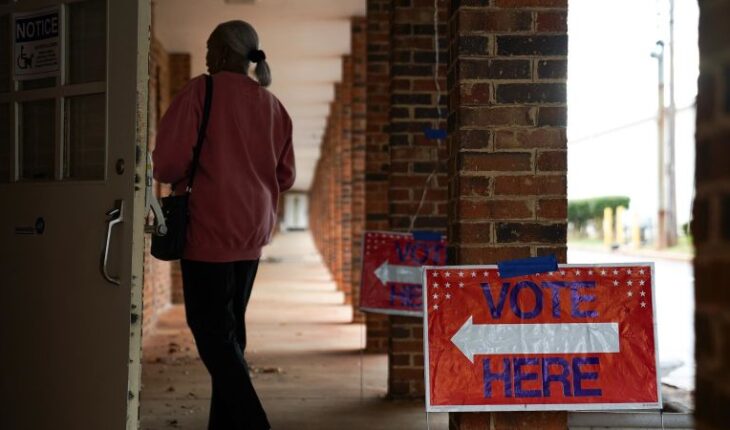
CNN
—
Neither Vice President Kamala Harris nor former President Donald Trump has established a clear advantage in the race for the White House in two key Southern battleground states, according to new CNN polls conducted by SSRS.
Likely voters in Georgia divide 48% for Trump to 47% for Harris, and in North Carolina, Harris stands at 48% to Trump’s 47%. Results are within the margin of error in both states, suggesting no clear leader in either contest.
Both states are hotly contested in this year’s presidential election. North Carolina, which narrowly supported Barack Obama in 2008, has voted Republican in the past three presidential elections. In 2020, however, it was the state where Trump earned his slimmest margin of victory. Joe Biden defeated Trump in Georgia by less than 1 percentage point four years ago, becoming the first Democrat to win the state since Bill Clinton in 1992.
The results suggest little movement since CNN’s late-August poll of Georgia and late-September poll of North Carolina, both of which also found no clear leader in the race. An overwhelming 95% of likely voters in each state now say they’ve made up their minds about their vote, leaving a dwindling pool of potentially movable voters, although one that’s still large enough to swing the race either way. More than half of the likely electorate in both Georgia (59%) and North Carolina (52%) say they’ve already cast their ballots, with those voters splitting narrowly toward Harris by a 7-point margin in Georgia and by 6 points in North Carolina.
In both states, roughly two-thirds of Harris backers – 69% in Georgia and 67% in North Carolina – say they’re mostly voting to support her, rather than to oppose Trump. That’s a higher share than in CNN’s latest polling in the other five battleground states – Arizona, Michigan, Nevada, Pennsylvania and Wisconsin – where the average share hovers closer to 60%. Much of the difference is due to Harris’ Black supporters in Georgia and North Carolina, about 8 in 10 of whom say their vote is largely an endorsement of the vice president. That’s the case even as Black registered voters are less likely than White registered voters in both states to describe themselves as “extremely motivated” to vote.
Broad majorities of Trump backers in both states – 81% in Georgia and 75% in North Carolina – say their vote is primarily about support for the former president, rather than opposition to Harris. That’s similar to the share of Trump backers saying the same in other battleground states.
In a contrast to the razor-thin race for the White House, Democrat Josh Stein holds a clear advantage in the race for North Carolina governor, leading scandal-plagued Republican Mark Robinson, 53% to 37%, among likely voters. That’s due to significant ticket-splitting in favor of the Democrat down ballot: 77% of Trump voters in the state say they’re backing Robinson in the gubernatorial race, with 10% backing Stein and another 12% saying they wouldn’t vote for either of the major candidates. Nearly all of Harris’ supporters in the state, 96%, say they support Stein.
While the polls find similar political environments in Georgia and North Carolina overall, there are some significant differences.
Biden gets similarly low ratings for his job performance in each state: 39% of likely voters in North Carolina, and 37% in Georgia, say they approve. But the White House gets notably lower ratings for its response to Hurricane Helene in the Tar Heel State. Forty-two percent of likely voters in Georgia, but just 36% in North Carolina, say they approve of the way the Biden administration has handled the federal government’s response to Hurricane Helene, with sizable shares of likely voters in both states saying they are unsure how they view the response to the storm (17% in North Carolina, 14% in Georgia). Views of the administration’s storm response generally run parallel to partisanship, but still, 11% of Harris supporters in North Carolina say they disapprove of the way the Biden administration handled the response to Helene. In Georgia, the share of Harris backers disapproving stands at just 5%.
In both states, Harris leads among Black likely voters (84% to 13% in Georgia, 78% to 19% in North Carolina) and voters with college degrees (55% to 39% in Georgia, 53% to 42% in North Carolina). White college graduates split about evenly in both states (50% Harris to 47% Trump in North Carolina, 48% Trump to 46% Harris in Georgia). Trump holds a commanding lead, 81% to 15%, among White voters without college degrees in Georgia. He leads that group by a less overwhelming margin, 65% to 31%, in North Carolina.
In North Carolina, the poll finds Trump leading by 7 points among men and Harris ahead by 9 points among women. In Georgia, men favor Trump by the same margin, but women are closer to evenly split (49% favor Harris, 47% Trump). That close margin among women in Georgia is due to a massive gap between White women (66% Trump to 30% Harris) and women of color (79% Harris to 15% Trump). In both states, Harris holds a broad lead among voters who say they live in a city or urban area, with Trump holding a similarly broad advantage in rural areas. But suburban voters in Georgia are split, 48% Harris to 47% Trump, while suburban voters in North Carolina favor Harris, 53% to 42%.
Voters in these two states are among the most likely across battleground states to say that candidates’ positions on the issues are driving their choices more than their leadership traits and approach to the presidency – 58% in Georgia and 56% in North Carolina say issues are more critical to their choice.
Likely voters in both states give Trump the advantage over Harris on trust to handle immigration (by a 15-point margin in Georgia and a 12-point margin in North Carolina), foreign policy (by a 9-point margin in both states) and the economy (by an 8-point margin in both states). They give Harris the lead on trust to handle abortion and reproductive rights (by a 15-point margin in North Carolina and a 13-point margin in Georgia), with voters in both states closely split on which candidate they more trust to protect democracy.
Voters in Georgia say by an 8-point margin that they see Harris, not Trump, as the candidate who cares more about people like them, while voters in North Carolina are more closely divided. In both states, Harris is seen as the more honest and trustworthy candidate, while Trump holds a slim advantage as the candidate better able to bring needed change.
Roughly 8 in 10 likely voters in each state say they’re at least somewhat confident that votes in their state will be accurately cast and counted in this year’s election. In both states, that rises to roughly 9 in 10 among Harris supporters, with 74% of Trump voters in North Carolina and only two-thirds of the Republican’s backers in Georgia saying the same.
Interviews were conducted October 23-28, 2024, online and by telephone with registered voters, including 732 voters in Georgia and 750 in North Carolina. Likely voters include all registered voters in the poll weighted for their predicted likelihood of voting in this year’s election. Results among likely voters in Georgia have a margin of sampling error of plus or minus 4.7 percentage points; it is 4.5 points among likely voters in North Carolina.


